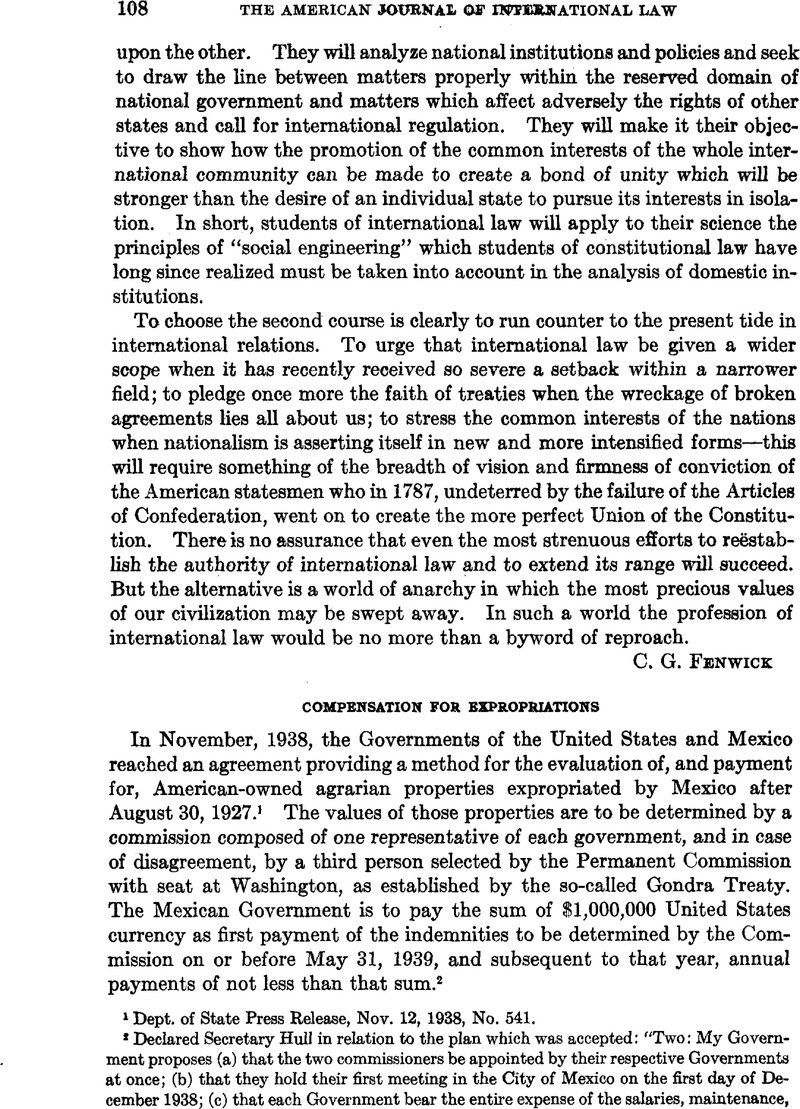Published online by Cambridge University Press: 12 April 2017

1 Dept. of State Press Release, Nov. 12, 1938, No. 541.
2 Declared Secretary Hull in relation to the plan which was accepted: “Two: My Government proposes (a) that the two commissioners be appointed by their respective Governments at once; (b) that they hold their first meeting in the City of Mexico on the first day of December 1938; (c) that each Government bear the entire expense of the salaries, maintenance, transportation, and incidentals of its commissioner and his staff and that any expense incurred jointly, as for instance in connection with airplane travel, be shared equally.
“Three: My Government believes it important, and understands that your Government is in accord in this regard, that a time limit be established for the completion of the work of the commissioners. It is therefore proposed that the commissioners be instructed that they must complete the determinations of value by not later than May 31, 1939. If during the course of the deliberations of the two commissioners they are unable to reach a common finding upon the matters submitted to them for their joint determination, my Government proposes that the Permanent Commission at Washington be requested to appoint immediately the third commissioner in order that he may resolve the matters upon which the two Governments’ commissioners are unable to agree. It is further proposed that in case of disagreement in any particular case, the representative appointed by the Permanent Commission be requested to render his award within not more than two months from the time the case is submitted to him. The salaries and expenses of the third commissioner will be defrayed in equal proportions by the two Governments. . . .
“Five: It is my understanding that the Mexican Government will pay the sum of $1,-000,000 United States currency as first payment of the indemnities to be determined by the Commission to which this note refers, and that this payment will be made to the Government of the United States on or before May 31, 1939.
“It is my further understanding that immediately subsequent to the determination by the Commission of the final valuation, in accordance with the procedure indicated in numbered paragraph Four of this note, of American-owned agrarian properties as defined in numbered paragraph One, the two Governments will reach an agreement as to the amounts to be paid to the Government of the United States by the Government of Mexico annually for the account of such claims in the years subsequent to the year 1939. As the basis for such agreement there will be taken into consideration such statement of its ability to pay as may be demonstrated by the Government of Mexico. The Government of Mexico, I understand, agrees that the annual payments to be made by it to the Government of the United States subsequent to the year 1939 for the account of these claims will in no event be less than $1,000,000 United States currency, and that such payments will be made on June 30 of the corresponding year.” Ibid.
3 Dept. of State Press Release, Aug. 25, 1938, this Journal, Supp., Vol. 32 (1938), p. 191. See, in this connection, “Confiscatory Expropriation,” this Journal, Vol. 32 (1938), p. 759.
4 Ibid. In what follows, the writer makes full use of portions of a forthcoming report, of which he is a co-author, from the Section on International Law of the American Bar Association, to be duly submitted to the members of that organization.
5 The word “compensation” is, in view of its derivation from the Latin verb, compensare, properly defined as “counterbalance, rendering of an equivalent, requital, recompense.” (Murray’s New English Dictionary, Pt. VI, 717.) The etymologist may, therefore, object to the use of any adjective for the purpose of accentuating or describing the fullness or sufficiency of the return to be made by the compensator.
6 Olson v. United States, 292 U. S. 246, 255.
7 Note of Nov. 9, 1938. Dept. of State Press Release, Nov. 12, 1938, No. 541.
8 He adverted to Secretary Hull’s note of Nov. 9,1938, as one in which the Government of the United States, “while maintaining its opinion that the recognized principles of law and equity require the immediate payment of just compensation for expropriated properties, makes known its readiness to agree to a plan which, based on the proposals of my Government, may apply to the consideration and payment of agrarian expropriations (afectaciones) subsequent to 1927.” Ibid.
9 It is needless to add that the accord also marks respect by the expropriator of the theory that compensation should be given for what is expropriated.